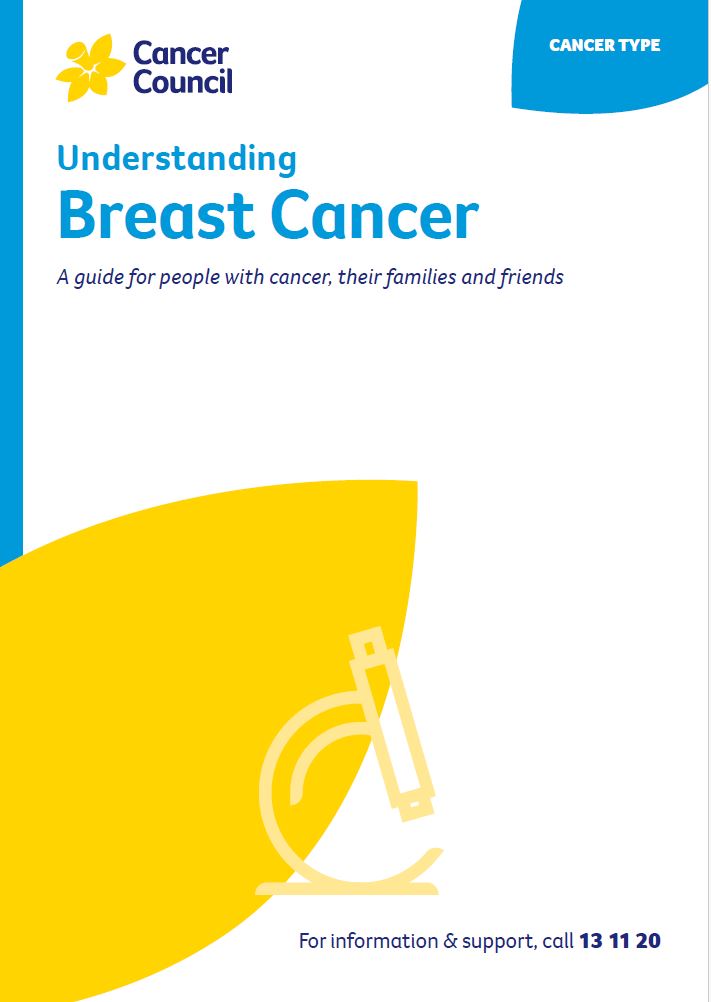- Home
- Breast cancer
- Treatment
- Surgery
- Side effects of surgery
Side effects of surgery
Some common side effects are discussed below. Talk to your treatment team about the best ways to deal with them.
For more on this, see Managing side effects.
Learn more about:
Fatigue
Cancer treatment and the emotional impact of the diagnosis can be tiring. Fatigue is common and may continue for weeks or months. Research shows that exercise during and after cancer treatment is safe and can help improve fatigue.
Cancer Council may run an exercise program near you – call 13 11 20. You can also ask your GP if you are eligible for some Medicare-funded sessions with an exercise physiologist or a physiotherapist.
For more on this, see Fatigue and cancer and Exercise and cancer, or listen to our podcast on fatigue and watch our video on exercise below.
Shoulder stiffness
Arm and shoulder pain, weakness, stiffness and reduced movement are common after surgery and after radiation therapy. Ask your treatment team when you can start exercising your arm. A physiotherapist or exercise physiologist can show you exercises to reduce shoulder stiffness or pain. This may help prevent lymphoedema.
For more on this, see Arm and shoulder exercises after breast surgery.
Numbness and tingling
Surgery can bruise or injure nerves. You may feel numbness and tingling in the armpit, upper arm or chest area. You may also notice a loss of feeling in your breast or nipple.
These changes often improve within a few weeks but may take longer. Sometimes the numbness or tingling may not go away completely. A physiotherapist or occupational therapist can give you exercises that may help.
Seroma
Fluid may collect in or around the surgical scar and cause a balloon-like swelling. This is most common after a mastectomy. A seroma can also develop in the armpit after an ALND. The build-up of fluid can be uncomfortable but is not harmful.
Some breast care nurses, your specialist or GP, or a radiologist can drain the fluid using a fine needle and a syringe. This procedure is not painful, but it may need to be repeated over a few appointments.
Lymphoedema
Fluid building up in the tissue of the arm or breast may cause swelling after any lymph node surgery. It’s common to have some swelling of your arm or breast after surgery, but this usually settles in the weeks afterwards.
If this swelling builds up over weeks or months, this usually means you have lymphoedema. It can happen any time, even years after surgery (or radiation therapy) to the lymph nodes.
Learn about ways to prevent and manage the symptoms of lymphoedema and see Lymphoedema.
Post-mastectomy pain
It is rare to have prolonged pain after a mastectomy but you may find the scar uncomfortable for some time. If pain or discomfort is ongoing, let your treatment team know.
Cording
Also known as axillary web syndrome, cording is caused by hardened lymph vessels. It feels like a tight cord running from your armpit down the inner arm, sometimes to the palm of your hand.
Learn about ways to manage cording.
McGrath Breast Care Nurses are registered nurses specifically trained to support people with breast cancer from the time of diagnosis and throughout treatment. There are more than 200 McGrath nurses across Australia. For more information, visit mcgrathfoundation.com.au.
My experience is that lymphoedema is very manageable if you notice the signs early. Although I’d had lots of lymphoedema education I actually missed the signs and didn’t realise I had it until I developed cellulitis.
Suzanne
→ READ MORE: Radiation therapy for breast cancer
Podcast: Managing Cancer Fatigue
Listen to more of our podcast for people affected by cancer
Video: Exercise and cancer
More resources
Dr Diana Adams, Medical Oncologist, Macarthur Cancer Therapy Centre, NSW; Prof Bruce Mann, Specialist Breast Surgeon and Director, Breast Cancer Services, The Royal Melbourne and The Royal Women’s Hospitals, VIC; Dr Shagun Aggarwal, Specialist Plastic and Reconstructive Surgeon, Prince of Wales, Sydney Children’s and Royal Hospital for Women, NSW; Andrea Concannon, consumer; Jenny Gilchrist, Nurse Practitioner Breast Oncology, Macquarie University Hospital, NSW; Monica Graham, 13 11 20 Consultant, Cancer Council WA; Natasha Keir, Nurse Practitioner Breast Oncology, GenesisCare, QLD; Dr Bronwyn Kennedy, Breast Physician, Chris O’Brien Lifehouse and Westmead Breast Cancer Institute, NSW; Lisa Montgomery, consumer; A/Prof Sanjay Warrier, Specialist Breast Surgeon, Chris O’Brien Lifehouse, NSW; Dr Janice Yeh, Radiation Oncologist, Peter MacCallum Cancer Centre, VIC.
View the Cancer Council NSW editorial policy.
View all publications or call 13 11 20 for free printed copies.

